John Hurrell – 6 April, 2010
In this exhibition it ties in with the notion of the balloon being a symbol for the earth and its inhabitants, and its limited resources (paralleling the balloon's heated air) running out.
Various venues
4th Auckland Triennial
Last Ride in a Hot Air Balloon
Marine Hugonnier, Johanna Billing, Nick Austin, Shahab Fotouhi, Tino Sehgal
12 March - 20 June 2010
Continuing our look at the Triennial themes, this one is about the excursion; the journey. I could say ‘adventure’ but of course that can happen even if you don’t leave home. I want to skimpily draw out the notion of movement in some of these works - a trajectory. In this exhibition it ties in with the notion of the balloon being a symbol for the earth and its inhabitants, and its limited resources (paralleling the balloon’s heated air) running out.
Marine Hugonnier’s tripartite video installation (with three-coloured, matching carpet) featuring films of Afghanistan, the Amazon jungle and the Matterhorn seduces despite its attempts not to flaunt (or to subvert) exoticism and spectacle. The first shows various attempts to film the desolate landscape blocked by the military, the second shows a railroad being built by the Brazilian dictatorship that jeopardises the inhabitants and vegetation of the rain forest, and the third fabricates the documentation of an anticipated ‘last tourist balloon flight’ over the Swiss mountain, with spliced in black and white images of dramatically lit stuffed ‘Swiss’ deer in Disneyland. The work mourns the destruction of our planet, exuding a sense of despair and tragic inevitability.The balloon here becomes a symbol for freedom of thought and the unconfined body.
Johanna Billing’s more positive installation presents a video of four Scottish musicians in a band, learning to sail a yacht for the first time and developing their co-ordinating skills as a water-mobile team. They manoeuvre the craft out of Edinburgh harbour into the open sea and their increasing confidence as they return is accompanied by a haunting song by American cellist Arthur Russell, This is how we walk on the moon. The point here is the learning of navigational skills of course - that interactive process - not the distance travelled.
Iranian artist Shahab Fotouhi presents a linear sculpture made of black and white neon that shows the helicopter route taken by Shiite Muslim leader Ayatollah Khomeini on his triumphant return from exile after the 1979 revolution that toppled the Shah. The six stops that make up his itinerary result in a high curved doorway that becomes an ambiguous symbol for the country’s future, while the accompanying looped video shows Khomeini’s supporters attempting to clear a space in the dense crowd for the helicopter to land by whipping the edges of the packed multitude with leather belts. In Fotouchi’s hands, such imagery is a hint of the brutal ruthlessness to come.
For his contribution Tino Sehgal employs solo dancers to slowly move on their backs across the St. Paul Street gallery floor, using a repertoire of movements that reference details from a historic Dan Graham video (Roll, 1970) and two Bruce Nauman works (Floor-Wall Positions, 1968, and Elke Allowing the Floor to Rise Up Over Her, Face Up, 1973). The Graham element ensures there is more than a writhing motion involved that pinions the performer to one spot, but that there is some kind of lateral direction as well - initially away from the righthand edge of the gallery - to the lefthand side and back again.
Conland’s inclusion of Nick Austin’s sequence of paintings is amusing because painting is deliberately ignored in this Triennial. He here is not so much a painter as a maker of a sequence of story-boards or comic-strip frames for an imaginary animated DVD. Austin wittily toys with clashing notions of time by rendering a snail chomping through the yellow pages of a book so that these eventually are transmuted into the shape of an ice skating boot with blade.
This snail thus alters a time consuming book so it becomes a high velocity projectile capable of great acceleration and, in the context of this show, risk. There seems to be some sort of paradoxical pun going on about immediacy of communication, verbal language and narrative imagery - a subversive joke that gives the finger to (now slow moving) dexterity with words in order to favour more laboriously layered (but incongruously speedier) signs or semaphores. On a more straight forward level it advocates the digestion of ideas and the power of thought.
Next Triennial theme: The Imagination
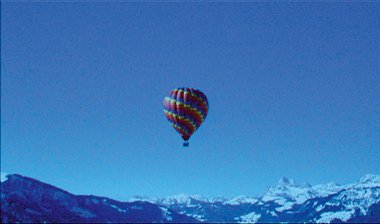
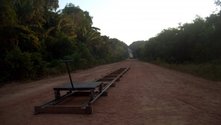
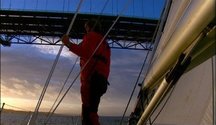
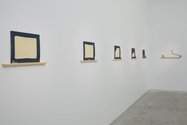
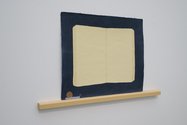

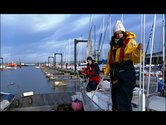
 Two Rooms presents a program of residencies and projects
Two Rooms presents a program of residencies and projects Advertising in this column
Advertising in this column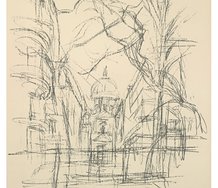
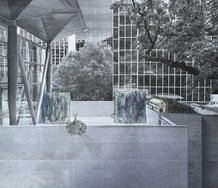
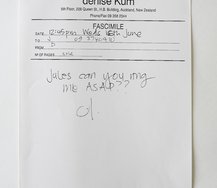
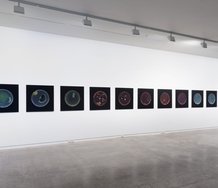
This Discussion has 0 comments.
Comment
Participate
Register to Participate.
Sign in
Sign in to an existing account.